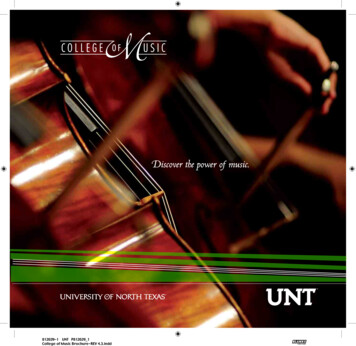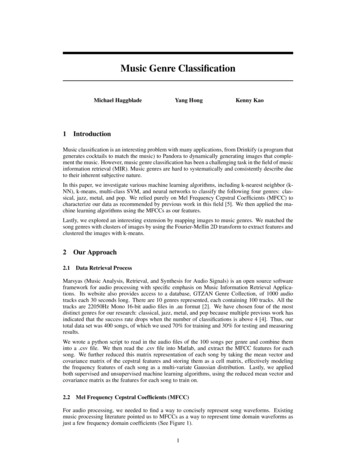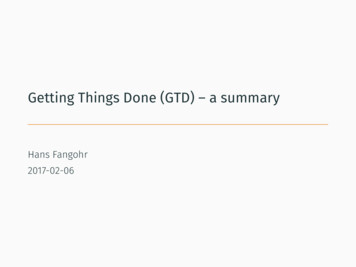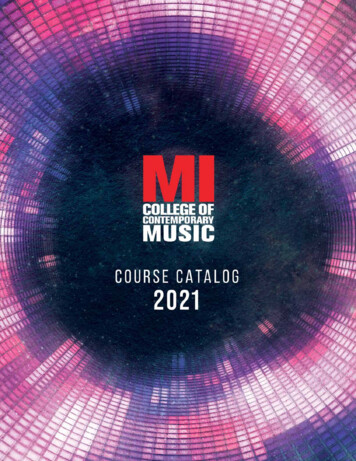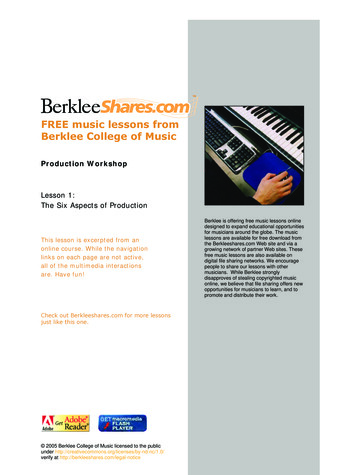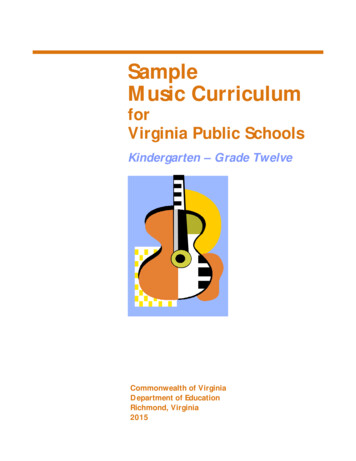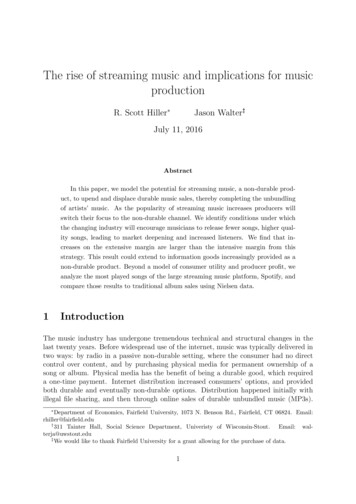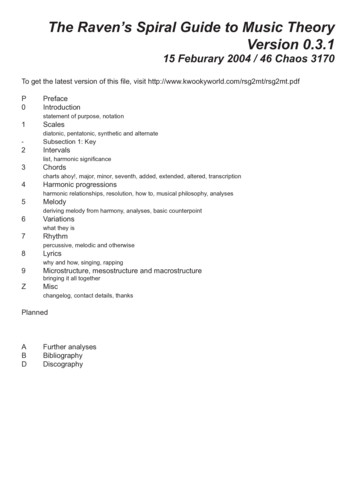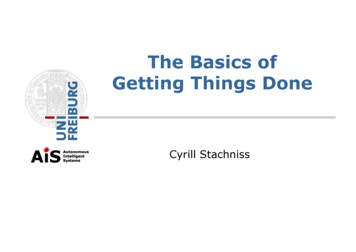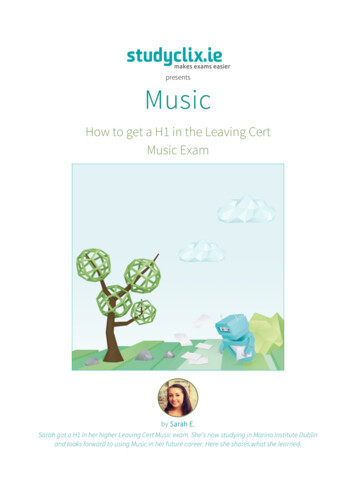
Transcription
presentsMusicHow to get a H1 in the Leaving CertMusic Examby Sarah E.E.Sarah got a H1 in her higher Leaving Cert Music exam. She’s now studying in Marino Institute Dublinand looks forward to using Music in her future career. Here she shares what she learned.
Music is a great subject to do for the Leaving Cert. I always felt very lucky going into music class,as there were many relaxed and enjoyable moments, but we still learned lots. For me, a classwhere I spent a lot of time either playing or listening to music, was a great choice.Table of Contents:Leaving Cert Music – An Overview3Key Dates4The Breakdown of Marks5The Practical Exam6The Written Exam10Some Final Tips132
Leaving Cert Music – An OverviewMost people who do Music for LC do, or have done music outside school at some point, often learningan instrument. Many of them hope to maybe pursue a career in music. Careers in music include: Performing (voice or instrument) Song writing Composing music for films, video games, or advertising Recording and producing Music business and touring Music Health (e.g. therapy of children through the use of music) Music TeachingDoing Music outside school gives you a great head start. If you are advanced at your instrument,some of what you do in music class will just be revision. It is essential that you either play aninstrument or sing for Leaving Cert music. It’s never too late to improve though!Advantages of doing LC Music: Music has a very high rate of good grades. This is probably because many people do much oftheir learning in their instrument classes outside of school. One of my favourite things about doing Leaving Cert Music was that our class had lots ofopportunities to perform. We were sought for the choir, musicals, open evenings, masses, andgraduation ceremonies. I really enjoyed this aspect of Music class and I think my confidence grewgreatly as a result. It also really bonded our class strongly together. My final point about Leaving Cert music is that you can have passed it before you ever sit theexam! I think this is brilliant. Because the practical is worth 50%, if you do a very good practical,3
then you have already passed overall. This helps spread-out the pressure much more evenlythroughout the year in comparison to other subjects.In summary, the advantages of Leaving Cert music are: A more relaxed subject than most Great for students who have an interest in music outside of school Great for students who would like to pursue music as a career High rate of good grades Lots of performance opportunities Ability to perform with friends, in the practical You can have passed Leaving Cert music before you sit the examKey Dates – Don’t Forget Them!Know your dates in order to be well prepared and to stay focused: The LC Oral Tests and Practical Music Tests are usually between March 25th and April 9th. The HL elective in composing is due on the last Friday in April. (Most people don’t do this). The LC Written Exam is usually between the 18th and 23rd June.4
The Breakdown of MarksThere is a total of 400 marks going for LC Music, i.e. each 4 marks equals 1%. Below I am giving themarks at the overall percentage of your Leaving Cert Music grade, for each element.ThereThere are four elements to the LC MusicMusic course:1.Listening25%100 marks2.Composition25%100 marks3.Practical25%100 marks4.Elective25%100 marksHowever, almost everyone does the practical elective,elective, which adjusts the marks to:1.2.3.Listening25%100 marksQ16.25%25 marksQ22.5%10 marksQ32.5%10 marksQ42.5%10 marksQ56.25%25 marksComposition25%100 marksSection A: Melody Composition10%40 marksSection B: Harmony15%60 marksPractical50%200 marksThe breakdown for the practical can be more complicated. Unprepared tests always account for5% of your overall mark (i.e. 20 marks). The remaining 45% of your overall mark is split betweenyour performance and your music technology, depending on your choices, and your level.5
The Practical ExamThe standard of performances is generally very high. Music presented often exceeds requiredstandard. As such, don’t over prepare for it at the cost of exam study time.General: Some of the Leaving Cert practical exam can be done with group recitals. I wouldrecommend this if you are a nervous performer. If having a friend strum their guitar while yousing helps, then go for it. You have a couple of options with the practical - you can do 1 or 2 activities:-1 Activity - You play 6 pieces of your choice marked to honors standard.-2 Activities - You play 4 pieces of your choice for each activity, marked to ordinary levelstandard. (For example: 4 pieces on one instrument / voice and 4 on another, or 4 on oneinstrument / voice and Music Technology.) Normally the Music teachers advise that it is easier to score with two activities even thoughthat gives 8 pieces in total, as the standard expected is lower. You have a total of 25 mins toplay and the standard expected is around grade 5/6, although the Department of Educationnever mention actual grades anywhere. I wouldn’t recommend that you play higher than thateven if you are able, as it’s wasted effort and you’re more likely to make a mistake. You must choose a variety of genres and pieces. Your teacher is the best person to advise youon what to pick. But I would STRONGLY suggest you settle on the pieces many weeks, or evenmonths, before the practical exam.6
Chosen Music and Standard of Performance:Performance:From the marking scheme, to get the highest points in your Chosen Music and Standard ofPerformance, you must achieve the following: Your control of the instrument or voice should have very good pitch, intonation, rhythm,control of sound, and tone quality. Your musicality, interpretation, and programme content should have excellent musicalperformance, confidence, sense of style (melodic and rhythmic), feel for words (if applicable),rhythm, phrasing and dynamics. For groups, the student being tested must make a positive input to the musical balance ofthe group, have very good interaction with the rest of the group and be a very strong memberof an ensemble. Your pitch and rhythmic accuracy should have note accuracy and be rhythmically consistent.7
Music TechnologyNot all schools do Music Technology, which is a pity, as it is quite simple. It has to be done onspecialised software but there are many tutorials for these on YouTube, if you need help gettingstarted. Music Technology involves inputting a few bars of sheet music into the software system,saving, closing, re-opening, playing and editing the file. Many students are a bit confused about what type of edits you might have to do. This wouldbe things like changing the metronome mark, changing the rhythm of notes, changing aninstrument or transposing work up or down 2 semitones. Much of this is just changing dropdown menus, or typing a higher tempo in the tempo box, so once you’ve seen it a few timesyou should be very fast at it. From the marking scheme, to get the highest points in your Music Technology, you mustachieve the following:-Inputting with complete note accuracy and very good control of the software.-Your musicality, interpretation and programme content should have very confidentinputting, very good musical outcome, very confident editing, printing, recording, savingand retrieving, very musical results of edits (where relevant), and very goodunderstanding of the system.-Your pitch and rhythmic accuracy should have note accuracy and rhythmically consistent.8
UnpreparedUnprepared Tests:Unprepared tests are to test your aural memory, your sight reading and your rhythm.From the marking scheme, to get the highest points in your Unprepared Tests, you must achieve thefollowing: Your sight reading should be fluent and accurate, have excellent tempo and dynamics and bemusically expressive. Your aural memory should have confident response, be accurate, have an excellent feeling forpulse, and be fluent. Your improvisation should have excellent development of given material, excellent responseand feeling for pulse, and fluency.P racrac tical Exam Recap:So, to recap, my top tips for the practical exam would be: Two groups of four pieces / songs is easier to get marks on than one group of six. Consider doing Music Technology, as it’s actually very easy when you get the hang of it. Ifyou’ve practised it a few times, you shouldn’t have a problem. Do your practical with a group if it helps you feel relaxed. Make sure you have practised with your accompanist. Perform with confidence.9
The Written ExamListening:This consists of questions on your set works, Irish music (including a short essay) and a piece thatyou most likely won’t have heard before. You need to actively listen to the pieces. For the classicalpieces, you need to know the Form, Instruments, and Themes of the pieces. It’s tricky butmanageable. The books are helpful. Some more specific advice below.Depending on the set works in your year, you will need to know certain vocabulary. Your teacher willadvise you as to what vocabulary you need for your pieces. There won’t be a lot of words for each,but make sure you know them and use them correctly. Baroque pieces: Know the sections; be able to tell them apart and what order they're in, andwhat voices and instruments sing where. Modern pieces: Know recording techniques, the instrumentation, the chord progressions.This is a relatively easy one. Contemporary pieces: Be able to tell all the sections apart and know what section comesnext (it helps if you have some kind of storyline to it all because it may be difficult dependingon the composer). Know the composer’s compositional techniques like retrograde, inversion,canon. Know the instrumentation. Romantic pieces: Know the instrumentation, rhythmic features. Irish music: Know the difference between a reel, jig and hornpipe. Be able to tell instrumentsapart and know features of sean-nós singing. There's a 10-mark question at the end whereyou write a short essay about something like the harping tradition. They give you 4 options to10
choose from. Because the question is time restricted, write fast, and stick to bullet points andshort sentences. Make sure you get the main points down.Top tips for the Listening Section:Section: Give more details on the set works. Many students are losing marks for giving answers thatare vague. You won’t lose marks for too much detail, but you will for too little. Remember that the Irish Music question is only 2.5% of the total mark. Don’t spend too longlearning it, and give short but informative sentences. The aural skills question is quite easy, use this to your advantage to get marks.11
Compositionomposition:sition:Knowing your theory is essential for composition. There are a few rules that you must know andfollow. You must answer two questions on the paper: Melody and Harmony. In my opinion, these arethe hardest questions on the paper. You have to be able to fill in a bar of a score of your set worksand the aural skills, just by listening. You need to have practised this. The melody writing section involves composing a melody to a given 4 bars, or compose in agiven dance meter, or compose to set words (e.g. a poem). The harmony writing section involves either composing bass notes and chords to a giventune, or adding descant and chords to a given tune, or composing a melody and bass fromgiven chords.My Top Composing Tips for Section A: Melody Composition Need to be rhythmically accurate. Don’t confine rhythm patterns in melodies to those given in opening phrases. Don't forget to insert phrasing or expression marks.My Top Composing Tips for SectionSecti on B: Harmony Most students have difficulty completing the bass line correctly. Practise this before theexam, and get your teacher to help. Cadences are generally okay to recognise, but make sure you get the correct bass note.12
Some Final Tips Be confident when you are performing on front of your class mates. We all have shy moments,but the more preparation and practise you do, the easier it will be at the time of your practicalexam. Download your set workswo rks onto your phone.phone. Listen to them occasionally. You will quicklybecome quite familiar with them. Attempt every part to every question. Even if you know very little, write it down. If you make a mistake and have a better answer, put a line through it and try again. Don’t Tippexit out! If you think your answer is wrong, but don’t have anything better, then leave it there.there. Use the resources on StudyclixStudyclix.lix. Practising past questions will help you be more prepared! Read through all the available resources on examinations.ie – there are past papers, markingschemes, past aural tests, sight tests, improvisation tests and so on. These are invaluable. Take advantage of the fact that you get to spread the workload throughout the year,completing 50% of your marks long before the written exam. Take advantage of the fact that it’s one of your last exams, so there’s a good chance you’ll havea few days exam-free beforehand to study.13
Finally, I would like wish youthe best of luck in the exam!You will be fine. 14
Song writing Composing music for films, video games, or advertising Recording and producing Music business and touring Music Health (e.g. therapy of children through the use of music) Music Teaching Doing Music outside school gives you a

